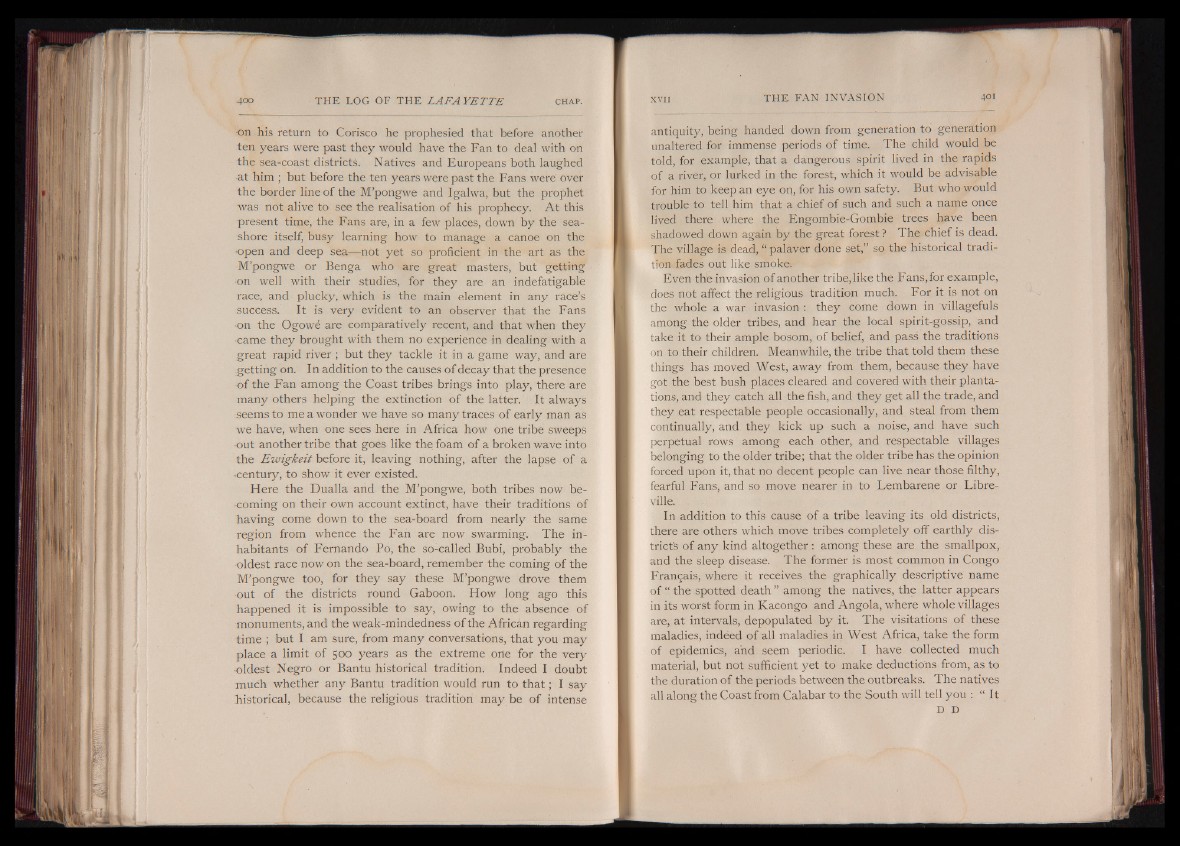
on his return to Corisco he prophesied that before another
ten years were past they would have the Fan to deal with on
the sea-coast districts. Natives and Europeans both laughed
* t him ; but before the ten years were past the Fans were over
the border line of the M’pongwe and Igalwa, but the prophet
was not alive to see the realisation of his prophecy. A t this
present time, the Fans are, in a few places, down by the seashore
itself, busy learning how to manage a canoe on the
open and deep sea— not yet so proficient in the art as the
M’pongwe or Benga who are great masters, but getting
on well with their studies, for they are an indefatigable
race, and plucky, which is the main element in any race’s
success. It is very evident to an observer that the Fans
on the Ogowe are comparatively recent, and that when they
■came they brought with them no experience in dealing with a
great rapid river ; but they tackle it in a game way, and are
getting on. In addition to the causes of decay that the presence
o f the Fan among the Coast tribes brings into play, there are
many others helping the extinction of the latter. It always
seems to me a wonder we have so many traces of early man as
we have, when one sees here in Africa how one tribe sweeps
out another tribe that goes like the foam of a broken wave into
the Ewigkeit before it, leaving nothing, after the lapse of a
century, to show it ever existed.
Here the Dualla and the M’pongwe, both tribes now becoming
on their own account extinct, have their traditions of
having come down to the sea-board from nearly the same
region from whence the Fan are now swarming. The inhabitants
of Fernando Po, the so-called Bubi, probably the
-oldest race now on the sea-board, remember the coming of the
M’pongwe too, for they say these M’pongwe drove them
•out of the districts round Gaboon. How long ago this
happened it is impossible to say, owing to the absence of
monuments, and the weak-mindedness of the African regarding
time ; but I am sure, from many conversations, that you may
place a limit of 500 years as the extreme orte for the very
eldest Negro or Bantu historical tradition. Indeed I doubt
much whether any Bantu tradition would run to th a t; I say
historical, because the religious tradition may be of intense
antiquity, being handed down from generation to generation
unaltered for immense periods of time. The child would be
told, for example, that a dangerous spirit lived in the rapids
of a river, or lurked in the forest, which it would be advisable
for him to keep an eye on, for his own safety. But who would
trouble to tell him that a chief of such and such a name once
lived there where the Engombie-Gombie trees have been
shadowed down again by the great forest ? The chief is dead.
The village is dead, “ palaver done set,” so the historical tradition
fades out like smoke.
Even the invasion of another tribe, like the Fans, for example,
does not affect the religious tradition much. For it is not on
the whole a war invasion : they come down in villagefuls
among the older tribes, and hear the local spirit-gossip, and
take it to their ample bosom, of belief, and pass the traditions
on to their children. Meanwhile, the tribe that told them these
things has moved West, away from them, because they have
got the best bush places cleared and covered with their plantations,
and they catch all the fish, and they get all the trade, and
they eat respectable people occasionally, and steal from them
continually, and they kick up such a noise, and have such
perpetual rows among each other, and respectable villages
belonging to the older tribe; that the older tribe has the opinion
forced upon it, that no decent people can live near those filthy,
fearful Fans, and so move nearer in to Lembarene or Libreville.
In addition to this cause of a tribe leaving its old districts,
there are others which move tribes completely off earthly district's
of any kind altogether : among these are the smallpox,
and the sleep disease. The former is most common in Congo
Français, where it receives the graphically descriptive name
of “ the spotted death ” among the natives, the latter appears
in its worst form in Kacongo and Angola, where whole villages
are, at intervals, depopulated by it. The visitations of these
maladies, indëed of all maladies in West Africa, take the form
of epidemics, and seem periodic. I have collected much
material, but not sufficient yet to make deductions from, as to
the duration of the periods between the outbreaks. The natives
all along the Coast from Calabar to the South will tell you : “ It
D D